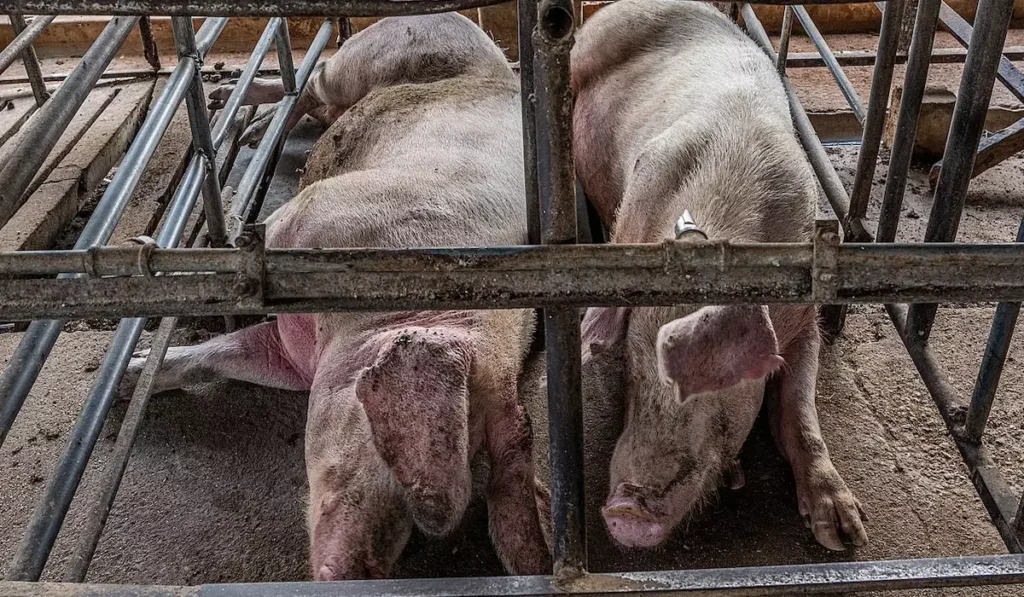Lawmakers say that overturning American elections to benefit foreign-owned pork-producing corporations is not in the national interest
Washington, D.C. — In yet one more showing of building opposition to the EATS Act and any of its potential derivatives, 16 Republican House Members sent a letter today to the leaders of the House Committee on Agriculture urging that the anti-states-rights measure be omitted from the Farm bill. The letter was led by Reps. Andrew Garbarino, R-N.Y., David Valadao, R-Calif., Mike Waltz, R-Fla., and Nancy Mace, R-S.C.

Animal Wellness Action helped organize the letter, noting that the EATS Act would overturn key statewide elections, mainly to benefit Smithfield and other foreign-owned pork industry conglomerates. Specifically, the primary targets of the EATS Act are Proposition 12 in California and Question 3 in Massachusetts, which stipulate that whole pork cuts sold in those states must come from farms that do not severely confine the sows in gestation crates.
Other signers of the letter are Vern Buchanan, R-Fla.; Buddy Carter, R-Ga.; Brian Fitzpatrick, R-Pa.; Mike Garcia, R-Calif.; Lance Gooden, R-Texas; Tom Kean, R-N.J.; Young Kim, R-Calif.; Michael Lawler, R-N.Y.; Carol Miller, R-W.V.; Alex Mooney, R-W.V.; Chris Smith, R-N.J.; and Jeff Van Drew, R-N.J.
“The transition away from gestation crates, which has been in motion for the last two decades, shows again that American farmers are the most adaptable and innovative in the world,” noted the 16 Republican signers. “Farmers know how to compete, and they don’t need the heavy and often distant hand of federal government picking winners and losers.”
This letter comes after 171 House members (166 Democrats and 5 Republicans) and 30 Senators (29 Democrats and 1 Republican) sent letters to Agriculture Committee leaders some weeks ago opposing the sweeping bill to nullify state agriculture laws called the EATS Act.
Nearly 40 percent of U.S. breeding sows are already in group housing systems, rather than gestation crates, according to a recent market analysis and report issued by the Center for a Humane Economy and Animal Wellness Action. The report documents that California and Massachusetts together will require just 6 percent of total U.S. pork production to come from facilities that allow the sows an opportunity to lie down, stand up, and turn around. It also underscores that the industry has been expanding gestation-crate-free production since Florida banned the use of gestation crates in 2002 and that it has more than ample capacity right now to supply all the needed gestation-crate free pork in two states.
“If this pork-specific provision is incorporated into the Farm Bill, it would provide [Chinese owners of U.S. factory farms] with a mechanism to bypass state-level laws and rapidly acquire even more American land and pork industry assets with no restraints at all,” wrote the Republican lawmakers from all wings of the Republican conference.
“Well more than 200 lawmakers from both parties are on the record in opposing the EATS Act,” said Wayne Pacelle, president of the Center for a Humane Economy. “If leaders include any version of the highly partisan and dangerous EATS Act in the Farm bill, it will put passage of that important food-and-farm bill at risk.”
“The Congress should not be in the business of overturning state elections to drive more vertical integration within a U.S. pork industry already heavily infiltrated by foreign-owned factory-farming multinationals,” said Jim Keen, D.V.M., Ph.D., director of veterinary sciences for the Center for a Humane Economy and primary author of the recent report on the EATS Act.
Efforts to adopt a similar measure to EATS were rejected as amendments to the 2014 and 2018 Farm bills, and that was prior to the Supreme Court of the United States declaring that Prop 12 and Question 3 were constitutional and proper exercises of state authority.
The National Pork Producers Council has come up on the losing side on five of five ballot measures on gestation-crate confinement, each one by double-digit margins, with landslide votes in California (63% “Yes” vote) and Massachusetts (78% “Yes” vote). It lost 12 of 12 court cases challenging Prop 2 and Prop 12, including the SCOTUS ruling in May 2023. The NPPC also lost the debate with 60 major food retailers, including giants in food retail such as McDonald’s, Costco, and Safeway that have strong anti-gestation-crate policies. In July, Governor Phil Murphy signed a ban on gestation crates in New Jersey after the Assembly passed a ban on gestation crates 73 to 1 and the Senate passed the measure 35 to 1.
The Center’s report notes that Prop 12 and Question 3 exempt all combined and canned pork products, which represent about 42 percent of pork sales in California and Massachusetts. This means that nearly half of the pork sold in these two states need not come from farms providing some ample living space to the sows.
Just two weeks ago, 16 state Attorneys General announced their opposition to the EATS Act. And weeks before that so did the National Governors Association, the National Association of Counties, and the League of Cities.

